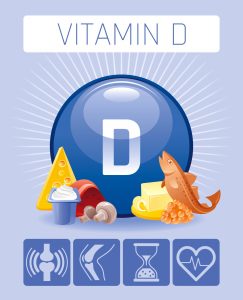 It’s well-known that healthy fats can help improve heart health. But did you know that they could also help you stay healthy all over as you get older? Omega-3 fatty acids are a form of unsaturated healthy fats. You can find these fatty acids in plant-based oils and vegetables like avocado. However, you can also find healthy fats in seafood like fatty fish. It’s this latter form of fatty acids that has been studied recently in connection with aging. Let’s take a look at what omega-3 fatty acids are, where you can find them, and how they can help you stay healthy as you age.
It’s well-known that healthy fats can help improve heart health. But did you know that they could also help you stay healthy all over as you get older? Omega-3 fatty acids are a form of unsaturated healthy fats. You can find these fatty acids in plant-based oils and vegetables like avocado. However, you can also find healthy fats in seafood like fatty fish. It’s this latter form of fatty acids that has been studied recently in connection with aging. Let’s take a look at what omega-3 fatty acids are, where you can find them, and how they can help you stay healthy as you age.
What are omega-3 fatty acids?
Omega-3 fatty acids are a type of polyunsaturated fatty acid you can find in plant-based oils like olive and flaxseed oils and other plant-based foods like nuts, seeds, avocado, and olives. These healthy fats can also be found in fatty fish like salmon, tuna, trout, mackerel, and sardines. The most common forms of omega-3 fatty acids include alpha-linolenic acid (ALA), eicosapentaenoic acid (EPA), and docosahexaenoic acid (DHA). You may see the names of such fatty acid types on the label of fish oil supplements.
You can find ALA in the plant-based oils, and EPA and DHA in fish, fish oils, and krill oils. Fish oils come about when fish consume phytoplankton that eat microalgae. The fish then accumulates omega-3 fatty acids in their tissues.
How much omega-3 fatty acids should you eat each day?
Most adults should have about 1.1 grams of omega-3 fatty acids a day, whereas those who are pregnant should have about 1.4 grams a day. Recommendations for children range from 0.5 grams to 1.0 grams, with younger children requiring less.
To give you an idea of how much omega-3 fatty acids are in certain foods, here are a few examples.
- Flaxseed oil contains 7.26 grams of ALA fatty acids per tablespoon.
- Chia seeds contain 5.06 grams of ALA fatty acids per ounce.
- English walnuts contain 2.57 grams of ALA fatty acids per ounce.
- Flaxseeds contain 2.35 grams of ALA fatty acids per ounce.
- Three ounces of cooked Atlantic farmed salmon contains 1.24 grams of DHA fatty acids and 0.59 grams of EPA fatty acids.
- Three ounces of cooked Atlantic wild caught salmon contains 1.22 grams of DHA fatty acids and 0.35 grams of EPA fatty acids.
Fish oil supplements are another option for fulfilling your daily fatty acid needs. A typical fish oil supplement contains about 1000 milligrams of fish oil that consists of 180 milligrams of EPA and 120 milligrams of DHA. An example of a high quality fish oil supplement is produced by Vita Sciences. The Vita Sciences Fish Oil contains 1000 milligrams of fish oil with 400 milligrams of EPA and 300 milligrams of DHA.
Omega-3 fatty acids and aging
So, what is healthy aging anyway? According to researchers at Tufts University at the Friedman School of Nutrition Science, healthy aging is a “meaningful lifespan without chronic diseases and with intact physical and mental function.” To see if omega-3 fatty acids could help promote healthy aging, these researchers looked at data from over 2600 people. They looked at the blood levels of omega-3 fatty acids in of adults enrolled in the United States Cardiovascular Health Study.
This study observed these levels of the people in the study over about 13 years. Study results show that people who consumed more DHA-rich seafood were 24-percent less likely to experience unhealthy aging than those who consumed the least. Researchers suggest that these results likely stem from the ability of omega-3 fatty acids to reduce inflammation and improve heart health.
Other ways you can age healthier
Besides eating plenty of healthy fats in your diet, there are other lifestyle factors that can help promote healthy aging.
- Stay active at least 30 minutes each day for most days of the week by walking, swimming, or engaging in other physical activities.
- Sleeping at least 7 hours each night. Although you may not think sleep is more important than your daily tasks, it is more important than you think. This is because while you sleep, your body helps to regulate many processes. These processes include blood pressure, hormones, fluids, and body temperature, to name a few. Therefore, be sure to add a good night’s sleep to your daily to-do list.
- Managing stress well through yoga, meditation, prayer, relaxation breathing, or talking to a counselor. This is because by managing stress, you can reduce inflammation in the body and in turn reduce risk of chronic disease. Therefore, be sure to make time to relax so your health can be at its best.
- Drinking plenty of water each day to stay hydrated. This is because water is needed for many processes in the body. For example, water helps prevent constipation so waste can leave the body and it helps carry nutrients and oxygen to cells.
- Consuming a plant-based diet with plenty of antioxidant-rich fruits and vegetables. A plant-based diet is important because the antioxidants found in such foods help reduce inflammation. Not only that, but fruits and vegetables can help provide heart healthy fiber and other heart healthy nutrients like potassium.
-written by Staci Gulbin, MS, MEd, RD
References:
Mayo Clinic (accessed October 21, 2018) “Nutrition and healthy eating: Functions of water in the body.” https://www.mayoclinic.org/healthy-lifestyle/nutrition-and-healthy-eating/multimedia/functions-of-water-in-the-body/img-20005799
National Institutes of Health Office of Dietary Supplements (June 6, 2018) “Omega-3 Fatty Acids: Fact Sheet for Health Professionals.”
National Sleep Foundation (accessed October 21, 2018) “How Much Sleep Do We Really Need?” https://www.sleepfoundation.org/how-sleep-works/how-much-sleep-do-we-really-need
Sandoiu, A. (October 18, 2018) “Seafood rich in omega-3 may promote healthy aging.” Medical News Today online.
 Diabetes can be a tough disease to manage. From doctor’s visits to medications to daily blood glucose checks, it can be a lot to juggle for anyone. Not only that, but having diabetes means diet changes that can make every meal or snack a challenge. Counting carbohydrates and reading labels can become a new task to take on every time you buy groceries. This can be time-consuming and can also make social events stressful.
Diabetes can be a tough disease to manage. From doctor’s visits to medications to daily blood glucose checks, it can be a lot to juggle for anyone. Not only that, but having diabetes means diet changes that can make every meal or snack a challenge. Counting carbohydrates and reading labels can become a new task to take on every time you buy groceries. This can be time-consuming and can also make social events stressful. If you have diabetes, you may or may not know that you are at higher risk for heart disease than those who don’t have diabetes. However, in addition to heart disease, you could also be at risk for bone health issues. This risk was discovered in a recent study that found those with diabetes were at higher risk for osteoporosis than those without diabetes. Therefore, this finding warrants further research on this risk. And in turn, standard diabetes diet and supplement treatments may need to be revised to account for this higher risk.
If you have diabetes, you may or may not know that you are at higher risk for heart disease than those who don’t have diabetes. However, in addition to heart disease, you could also be at risk for bone health issues. This risk was discovered in a recent study that found those with diabetes were at higher risk for osteoporosis than those without diabetes. Therefore, this finding warrants further research on this risk. And in turn, standard diabetes diet and supplement treatments may need to be revised to account for this higher risk. Obesity is a growing problem around the world today. Along with these growing statistics is also the growing amount of diet and exercise programs trying to help people lose weight. Recent research shows though that diet and exercise may not be the whole solution to the obesity issue. Vitamin D, also known as the sunshine vitamin, may be the key to helping people lose weight and lower risk of chronic disease.
Obesity is a growing problem around the world today. Along with these growing statistics is also the growing amount of diet and exercise programs trying to help people lose weight. Recent research shows though that diet and exercise may not be the whole solution to the obesity issue. Vitamin D, also known as the sunshine vitamin, may be the key to helping people lose weight and lower risk of chronic disease. Sleep is a valuable commodity. And it is a whole lot more important than many of us may think. How many times have you told yourself that you can survive on very little sleep. Or maybe you have said that you have more important things to do besides sleep. Sleep is not only important for providing you energy to get through the day. It can also impact your health in a major way if you don’t get enough. Recent research shows that getting more sleep at night could help you lose weight and improve health.
Sleep is a valuable commodity. And it is a whole lot more important than many of us may think. How many times have you told yourself that you can survive on very little sleep. Or maybe you have said that you have more important things to do besides sleep. Sleep is not only important for providing you energy to get through the day. It can also impact your health in a major way if you don’t get enough. Recent research shows that getting more sleep at night could help you lose weight and improve health. An essential part of a heart healthy diet is plenty of plant-based unsaturated fats. Not only do plant-based foods provide heart-healthy fiber, but they are also rich in antioxidants. These antioxidants can help reduce inflammation in the body, and in turn reduce chronic disease risk. One such group of antioxidants are the omega-3 fatty acids found in such foods as avocado, plant-based oils and fatty fish. Recent research shows that these healthy fats may be able to help with mental health. A recent study shows that by increasing the amount of healthy fats in your diet, you could help reduce symptoms of anxiety.
An essential part of a heart healthy diet is plenty of plant-based unsaturated fats. Not only do plant-based foods provide heart-healthy fiber, but they are also rich in antioxidants. These antioxidants can help reduce inflammation in the body, and in turn reduce chronic disease risk. One such group of antioxidants are the omega-3 fatty acids found in such foods as avocado, plant-based oils and fatty fish. Recent research shows that these healthy fats may be able to help with mental health. A recent study shows that by increasing the amount of healthy fats in your diet, you could help reduce symptoms of anxiety. The Greek-style diet has long been touted as one that is full of heart healthy benefits. These benefits are thought to stem from the vast array of healthy fats from plant-based sources and limiting of saturated fats from red meats as well as the rich source of fruits and vegetables in this Mediterranean regimen. However, the health benefits may extend much further than initially realized. A recent study shows that the Mediterranean diet may help to lengthen life of older adults.
The Greek-style diet has long been touted as one that is full of heart healthy benefits. These benefits are thought to stem from the vast array of healthy fats from plant-based sources and limiting of saturated fats from red meats as well as the rich source of fruits and vegetables in this Mediterranean regimen. However, the health benefits may extend much further than initially realized. A recent study shows that the Mediterranean diet may help to lengthen life of older adults. What is intermittent fasting exactly?
What is intermittent fasting exactly? Any kind of movement is good for health. Studies have shown time and again that sitting is bad for health. But, is one kind of exercise better than the other when it comes to weight loss? This is a controversial topic since some studies show that strength training can keep calories burning long after your workout. However, a recent study has shown that cardio exercise may actually be better than strength training in boosting metabolism.
Any kind of movement is good for health. Studies have shown time and again that sitting is bad for health. But, is one kind of exercise better than the other when it comes to weight loss? This is a controversial topic since some studies show that strength training can keep calories burning long after your workout. However, a recent study has shown that cardio exercise may actually be better than strength training in boosting metabolism. About alcohol
About alcohol